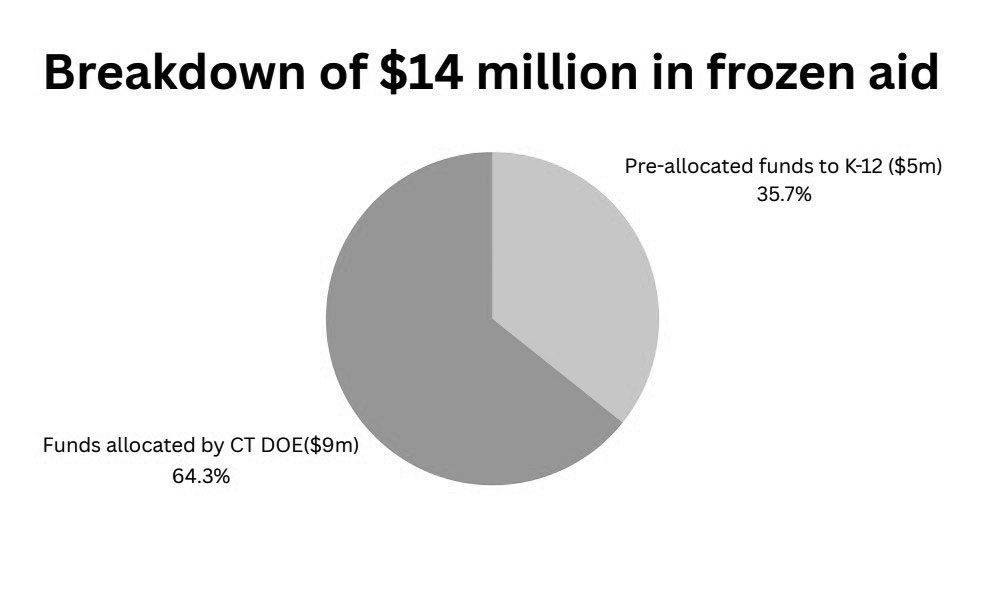Federal budget cuts have hit food programs across the country. Connecticut Foodshare, a major provider to people who qualify under The Emergency Food Assistance Program (TEFAP), has faced drastic budget cuts.
Connecticut Foodshare provides food based on TEFAP criteria. The criteria includes being a state resident, having an income at or below 300% of the federal poverty level and providing an address and number of people living in the household. As of March 26 34 TEFAP trailer loads equating to about 1.4 million pounds of food were cancelled.
The Local Food Purchase Assistance (LFPA) agreement, which would have bought $1 billion of food for pantries and school nutrition, was canceled in early March.
Connecticut Foodshare President and CEO Jason Jakubowski said in a statement, “Through the two prior rounds of funding through LFPA, Connecticut Foodshare was able to invest nearly $3 million with local Connecticut farmers to distribute more than 1 million meals to our neighbors across the state. The loss of this funding is immense, and it has a direct impact on both the people we serve as well as our local farm partners.”
HB 7021, An Act Concerning Funding for Nutrition Assistance, would allow Foodshare to buy necessary foods in bulk.
“One in eight Connecticut residents (including one in six children) [are] experiencing food insecurity,” said Jakubowski. “In response to these federal cuts, Connecticut Foodshare renews its call to Governor Lamont and the state legislature to pass HB 7021 into law. This bipartisan bill would fully fund the Connecticut Nutrition Assistance Program (CT-NAP) at $10 Million and it would require that at least 15% of those funds (or $1.5M) be used to purchase fresh food specifically from Connecticut farmers. At this point, this is the only way that we will be able to continue purchasing in bulk from local Connecticut farmers.”
Other bills to fund school lunch programs and food pantries in the Connecticut House of Representatives have been sent to the Connecticut appropriations committee, but while HB 7021 is tabled for discussion, food pantries are challenged to find ways to continue giving out regular food provisions.
In addition to the university food pantry at 19 Ruden St, WHEAT and Loaves & Fishes provide food for members of the Greater New Haven communities.
In March, the community service committee of the Forensic Science Student Association (FSSA) held a donation drive to assist WHEAT. FSSA offered event credits for food donation, and received over 20 donations in a week of tabling.
Located in the Wooster Square community in New Haven, Loaves & Fishes is the largest food pantry in the Greater New Haven area. On the Saturday after the budget cuts, reserves of dry food in the pantry were reduced to amounts that could not feed the hundreds of guests in need.
After their food giveaway on March 22, Loaves & Fishes sent an urgent request for donations via email that said they didn’t have sufficient reserve to feed their 360 guests that day. “Our budget,” said the email, “is not set up to purchase enough food to totally fund a weekly distribution of 400 people. We operate very lean and use wisdom with every monetary gift given.”
Food provided by the Loaves & Fishes pantry goes out weekly to hundreds of people who visit the basement of the Church of St. Paul and St. James. The pantry also sends bags of healthy, balanced meals to the local veterans hospital and elderly centers. Cuts in TEFAP funding put the local food providers who work with Connecticut Foodshare at risk of losing millions of meals.
According to another statement from Foodshare: “The people most impacted by these cuts are our already vulnerable neighbors: seniors, children, working families and people with disabilities. These cuts only serve to cause further harm.”








